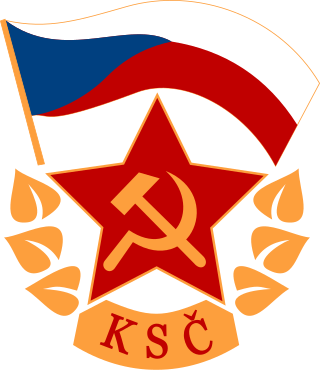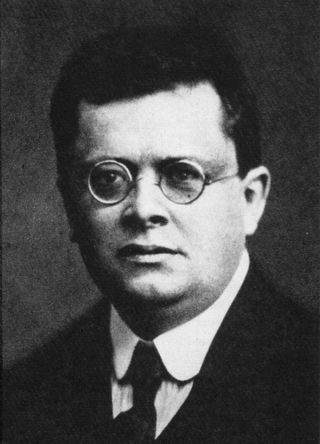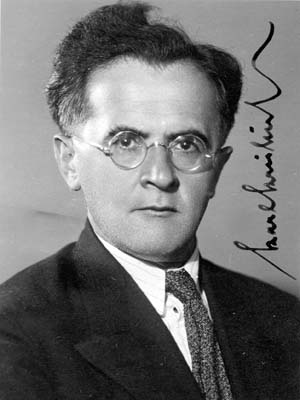Related Research Articles

The Communist International (Comintern), also known as the Third International, was an international organization existing from 1919 to 1943 which advocated world communism. The international, which was led and controlled by the Communist Party of the Soviet Union, created strict conditions of affiliation in order to keep out social democratic parties, and maintained a rivalry with non-Marxist socialists. It was intended as a replacement for the Second International, which had dissolved in 1916 during World War I.

The Communist Party of Czechoslovakia was a communist and Marxist–Leninist political party in Czechoslovakia that existed between 1921 and 1992. It was a member of the Comintern. Between 1929 and 1953, it was led by Klement Gottwald. The KSČ was the sole governing party in the Czechoslovak Socialist Republic though it was a leading party along with the Slovak branch and four other legally permitted non-communist parties. After its election victory in 1946, it seized power in the 1948 Czechoslovak coup d'état and established a one-party state allied with the Soviet Union. Nationalization of virtually all private enterprises followed, and a command economy was implemented.
With the collapse of the Austria-Hungary at the end of World War I, the independent country of Czechoslovakia was formed as a result of the critical intervention of U.S. President Woodrow Wilson, among others.

Antonín Zápotocký was a Czech communist politician and statesman in Czechoslovakia. He served as the Prime Minister of Czechoslovakia from 1948 to 1953, and then as President of Czechoslovakia from 1953 to 1957.
The Right Opposition or Right Tendency in the All-Union Communist Party (Bolsheviks) was a label formulated by Joseph Stalin in autumn of 1928 for the opposition against certain measures included within the first five-year plan, an opposition which was led by Nikolai Bukharin, Alexei Rykov, Mikhail Tomsky, and their supporters within the Soviet Union that did not follow the so-called "general line of the party". It is also the name given to "right-wing" critics within the Communist movement internationally, particularly those who coalesced in the International Communist Opposition, regardless of whether they identified with Bukharin and Rykov.

Czech National Social Party is a civic nationalist political party in the Czech Republic, that played an important role in Czechoslovakia during the interwar period. It was established in 1897 by break-away groups from both the national liberal Young Czech Party and the Czech Social Democratic Party, with a stress on achieving independence of the Czech lands from Austria-Hungary. Its variant of socialism was moderate and reformist rather than a Marxist one. After the National Labour Party dissolved and merged with National Socialists in 1930, the party also became the refuge for Czech liberals. Its best-known member was Edvard Beneš, a co-founder of Czechoslovakia and the country's second President during the 1930s and 1940s.

The Czechoslovak Socialist Republic, known from 1948 to 1960 as the Czechoslovak Republic, Fourth Czechoslovak Republic, or simply Czechoslovakia, was the Czechoslovak state from 1948 until 1989, when the country was under communist rule, and was regarded as a satellite state in the Soviet sphere of interest.

Bohumír Šmeral was a Czech politician, leader of the Czech Social Democratic Party, and one of the founders of the Communist Party of Czechoslovakia.

The International Association of Red Sports and Gymnastics Associations, commonly known as Red Sport International (RSI) or Sportintern was a Comintern-supported international sports organization established in July 1921. The RSI was established in an effort to form a rival organization to already existing "bourgeois" and social democratic international sporting groups. The RSI was part of a physical culture movement in Soviet Russia linked to the physical training of young people prior to their enlistment in the military. The RSI held 3 summer games and 1 winter games called "Spartakiad" in competition with the Olympic games of the International Olympic Committee before being dissolved in 1937.

The Marxist Left in Slovakia and the Transcarpathian Ukraine was a political organisation in eastern parts of the First Czechoslovak Republic. It was one of the forerunners of the Communist Party of Czechoslovakia.
Jaroslav Handlíř was a Czech politician and soldier who was a leader in both Czechoslovak and international communism and later joined the Social Democratic Party of Czechoslovakia.

The 2nd World Congress of the Communist International was a gathering of approximately 220 voting and non-voting representatives of communist and revolutionary socialist political parties from around the world, held in Petrograd and Moscow from July 19 to August 7, 1920. The 2nd Congress is best remembered for formulating and implementing the 21 Conditions for membership in the Communist International.

A popular front is "any coalition of working-class and middle-class parties", including liberal and social democratic ones, "united for the defense of democratic forms" against "a presumed Fascist assault". More generally, it is "a coalition especially of leftist political parties against a common opponent". However, other alliances such as the Popular Front of India have used the term, and not all leftist or anti-fascist coalitions use the term "popular front".
The Communist Party of Czechoslovakia, Section of the Communist International was a communist party in Czechoslovakia. The party emerged from a split in the German labour movement in the Czechoslovak Republic and functioned parallel to the Czech Marxist left movement for most of 1921. The party represented a more radical position compared to the Czech Marxist left, and fully supported adherence to the Communist International. It eventually merged into the Communist Party of Czechoslovakia.

Karl Kreibich, also known as Karel Kreibich, was a Sudeten German communist politician and author in Czechoslovakia. Kreibich emerged as the main leader of the revolutionary socialist movement amongst German workers in Bohemia after the First World War. He was a leader of the Communist Party of Czechoslovakia and a functionary of the Communist International. During the First Czechoslovak Republic, he was elected to parliament thrice. During the Second World War he was part of the exiled Czechoslovak State Council, based in London. After the war he served as Czechoslovak ambassador to the Soviet Union.
The International Socialist Party of Subcarpathian Rus' was a political party in Subcarpathian Rus', eastern Czechoslovakia. The party was formed in March 1920, by supporters of the now defeated Hungarian Soviet Republic and prisoners of war having returned from Soviet Russia. The party was one of the forerunners of the Communist Party of Czechoslovakia.
Ivan Mondok was a Carpatho-Ukrainian communist politician. He was born in 1893. He served as the secretary of the Transcarpathian regional organization of the Communist Party of Czechoslovakia.

Anarchism in the Czech Republic is a political movement in the Czech Republic, with its roots in the Bohemian Reformation, which peaked in the early 20th century. It later dissolved into the nascent Czech communist movement, before seeing a resurgence after the fall of the Fourth Czechoslovak Republic in the Velvet Revolution.
Sdružení československých horníků was a Syndicalist mine workers trade union in Czechoslovakia.

The 3rd World Congress of the Communist International (Comintern) was held in Moscow on 22 June–12 July 1921. The third official meeting of the Communist International included delegations from more than 50 different national structures and took place in the back-drop of two major events; the failure of the German revolution and the introduction of New Economic Policy in Soviet Russia.
References
- 1 2 3 Ladislav Cabada; Zdenek Benedikt (14 September 2010). Intellectuals and the Communist Idea: The Search for a New Way in Czech Lands from 1890 to 1938. Lexington Books. pp. 44–46. ISBN 978-0-7391-4378-0.
- ↑ Béla K. Király; Gunther Erich Rothenberg (1983). War and Society in East Central Europe: The Effects of World War I. Brooklyn College Press : distributed by Columbia University Press. p. 58. ISBN 978-0-88033-028-2.